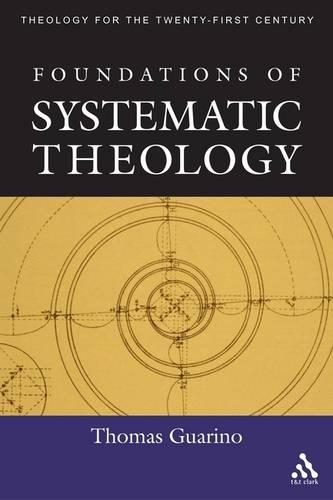
Foundations of Systematic Theology
(Paperback)
Publishing Details
Foundations of Systematic Theology
By (Author) Thomas G. Guarino
Bloomsbury Publishing PLC
T.& T.Clark Ltd
1st July 2005
United Kingdom
Classifications
Physical Properties
Paperback
368
620g
Description
Guarino argues in this book that the doctrinal form of the Christian faith, in its essential characteristics, calls for certain theoretical exigencies. This is to say that the proportion and beauty of the form is not served or illuminated by simply any presuppositions. Rather, a determinate understanding of first philosophy, of the nature of truth, of hermeneutical theory, of the predication of language and mutual correlation is required if Christian faith and doctrine are to maintain a recognizable and suitably mediative form. Failing to adduce specific principles will lead either to a simple assertion of Christian truth, in which case the form of Christianity becomes less intelligible and attractiveor one will substitute a radically changed form, which is itself inappropriate for displaying the fundamental revelatory narrative of faith. The house of Christian faith possesses a certain proportion of structure; the form will sag badly if one removes an undergirding item, or if one beam is replaced with another of variable shape or size. The form's beauty will either be obscured, no longer clearly visible, or the form will become something quite different, no longer architectonically related to what was originally the case. The intention of this book is to discuss those doctrinal characteristics considered fundamental to the Christian faith, as protective of its revelatory form and, concomitantly, to examine the theoretical principles required if such form is to remain both intelligible and beautiful.
Reviews
-Mention. Theology Digest/ Vol. 52 No. 3/ Fall 2005 -- Theology Digest
"In this rich and much-needed book, G. shows a wide familiarity with the relevant literature and acknowledges the legitimate concerns of recent theologians and philosophers, even as he defends the need and legitimacy of a first philosophy. At the same time, he recognizes the limits of his project. He is not trying to address the question of how church doctrine is related to the symbolic character of much scriptural language, nor is he trying to resolve issues that have emerged among proposed first philosophies. G.'s summary and adjudication of the contemporary critical need for a first philosophy should be studied by those on different sides of these questions." -M. John Farrelly, O.S.B., Theological Studies, December 2008
"Comparing the dogmas of Christian faith to beams that support an elegant structure, Thomas Guariono explores their capacity to withstand the critique mounted by Heidegger and his postmodern successors. To counter the critique, Guarino contends that while the words and expressions of faith may change, and while the divine mystery defies comprehensive knowledge, the affirmations of faith are abidingly true. His is a very timely book, bold in its conception, impressive in its erudition, sound and satisfying in its conclusions." -- Avery Cardinal Dulles, SJ * Blurb from reviewer *
Prof. Guarino's book is well timed. After a generation spent wandering in the wilderness of Postmodernity, theologians are ready to rediscover the importance of metaphysics. Guarino explains how foundationalism got a bad reputation among theologians, and he shows us how theology can reclaim its philosophical roots. Christians believe in God, but that should also mean that Christians believe in the truth. Guarino demonstrates how Christian convictions inevitably require metaphysical explication. This book is not for the philosophically timid. It is a robust defense of a faith as large and rigorous as the truth to which it testifies. It just might point the way forward to a new age of philosophical theology.--Stephen H. Webb, Professor of Religgion, Wabash College, and the author of The Divine Voice: Christian Proclamation and the Theology of Sound and American Providence -- Stephen H. Webb * Blurb from reviewer *
"A brilliant statement of theological first principles written by a Roman Catholic theologian with broad ecumenical sympathies. This is an important study for anyone engaged in theological work on this side of the Enlightenment, especially for those who seek to do this work in the tradition of fides quaerens intellectum." -Timothy George, Dean of Beeson Divinity School of Samford University and executive editor of Christianity Today * Blurb from reviewer *
Author Bio
Thomas G. Guarino is Professor of Systematic Theology at the School of Theology, Seton hall University, New Jersey
